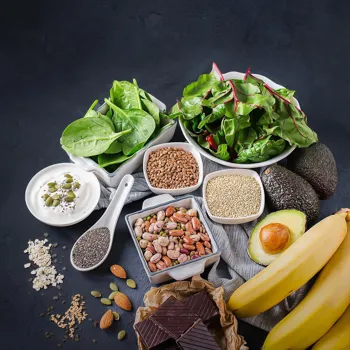Discover 10 Essential Vitamins and Minerals for Optimal Health in India. Dive into how to boost your well-being!
In today's fast-paced world, maintaining optimal health can feel like a juggling act. We're
constantly bombarded with information about the latest superfoods and miracle cures, but sometimes, it's best to go back to basics.
Focusing on essential vitamins and minerals is the foundation of good health, providing the building blocks our bodies need to function at their best. And guess what? Many of these nutrients are readily available in our everyday Indian diet!
So, let's dive into ten key vitamins and minerals and how you can easily incorporate them into your daily routine.
Vitamin A: superhero for eyes, immune system, and skin
First up, we have Vitamin A. This potent vitamin is like a superhero for your eyes, ensuring sharp vision and healthy corneas. Think of it as the guardian of your sight, protecting you from night blindness and age-related macular degeneration.
But Vitamin A is not just about your eyes; it also plays a crucial role in maintaining a healthy immune system, keeping those pesky colds and infections at bay. Finally, Vitamin A is vital for cell growth. It supports healthy skin as well, keeping it supple and radiant.
Add Vitamin A to your diet and watch your skin glow.
Vitamin C: antioxidant shield, boosts immunity, aids iron absorption
Next on our list is Vitamin C, a powerful antioxidant. An antioxidant helps your body from damage caused by free radicals which protects your cells. Think of Vitamin C as your body's shield, defending against harmful free radicals that can contribute to chronic diseases.
Vitamin C is a great choice since it helps to boost your immune system, making you less likely to be caught with that seasonal flus. Plus, it helps your body absorb iron, which is something that Indians suffer as there is a prevalence of anemia.
You can easily find in sources such as orange and also guavas.
Vitamin D crucial for bone health, even in sunny India
For healthy bones and teeth, Vitamin D is essential. In India, where sunshine is abundant, it might seem like Vitamin D deficiency wouldn't be a problem. However, many Indians still suffer from it due to limited sun exposure, especially those who spend most of their time indoors.
Being indoors is also a common trait that may lead to Vitamin D deficiency. Vitamin D helps your body absorb calcium, which is crucial for strong bones and preventing osteoporosis. So, even with the sunny skies, ensure you are getting enough of it.
Vitamin E: Skin's best friend & immune booster
Vitamin E is your skin's best friend. As an antioxidant helping protect your cells from damage, Vitamin E does great for the skin. We know that Vitamin E is great for the skin, protecting you from further damage from sun's harmful UV rays - keeping it youthful and radiant for longer.
It is also important for immune function, ensuring that your body is ready to fight against illnesses and diseases. Vitamin E is crucial for maintaining a healthy immune system.
Vitamin B12 crucial for nerve function & red blood cells, especially for vegetarians
Vitamin B12 is essential for nerve function and the formation of red blood cells. This is of specific importance for those who follow a vegetarian diet, as Vitamin B12 is primarily found in animal products.
Deficiency can lead to fatigue, weakness, and even neurological problems, so it's important to ensure adequate intake through fortified foods like cereals. Fatigue is a common symptom that can indicate a Vitamin B12 deficiency, so seek medical advice.
As it pertains to red blood cells, Vitamin B12 is crucial for the proper formation of these cells.
Calcium essential for muscle, nerve function, blood clotting
Calcium is not only for strong bones and teeth. This mineral is also vital for muscle function, nerve transmission, and blood clotting.
Dairy products are excellent sources, but if you're lactose intolerant or prefer non-dairy options, leafy green vegetables and fortified plant-based milks are great alternatives. Including calcium and getting sufficient amount is vital for muscle and nerve function.
This helps ensure proper muscle contractions and nerve signals are correctly transmitted. In addition to these benefits, calcium is also vital for blood clotting, which helps your body heal from cuts and bruises.
Iron is essential for health; combat deficiency with iron-rich foods
Iron is crucial for carrying oxygen throughout the body. Iron deficiency is a common problem in India, especially among women. It's essential for energy production and preventing anemia, a condition characterized by fatigue and weakness.
Boost your iron intake with leafy green vegetables, lentils, and fortified cereals. You can find fortified cereals in many grocery stores that include the vitamins and minerals that we often miss. So, it's a great way to complement your current diet.
In addition to these foods, beans, broccoli, and dried fruits are also good.
Magnesium is vital for body functions, eat almonds, spinach for it
Magnesium is essential for many bodily functions, including muscle and nerve function, blood sugar control, and blood pressure regulation. Aim to incorporate magnesium-rich foods like almonds, spinach, and whole grains into your diet. Magnesium helps maintain healthy blood sugar levels.

It makes sure that can reduce the risk of type 2 diabetes. Moreover, it promotes healthy blood pressure levels. Magnesium also contributes to the overall energy metabolism which helps the body convert food into energy.
Potassium is crucial for health, found in fruits and veggies
Potassium is essential for maintaining healthy blood pressure and heart function. It also plays a role in muscle contractions and nerve transmission. Many fruits and vegetables, such as bananas, potatoes, and spinach, are good sources of potassium.
It is the most common fruit and it's available year round and the most inexpensive option. You can also add it to your oatmeal!
Including regular potassium, it supports proper nerve signaling, which ensures that the body can transmit signals efficiently, which is essential for various physiological processes.
Zinc is vital for immune function, wound healing, cell growth, taste, and smell
Zinc is essential for immune function, wound healing, and cell growth. This powerful mineral is also important to one's taste and smell. Make sure you include zinc-rich foods like nuts, seeds, and whole grains in your diet. It plays an important part in cell growth.
This plays a significant role in cells in an infant. Zinc is also responsible for maintaining a sense of smell and taste. This helps you enjoy your food while ensuring that you have food choices. Make sure to include zinc in your foods.













